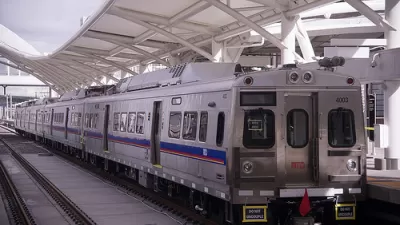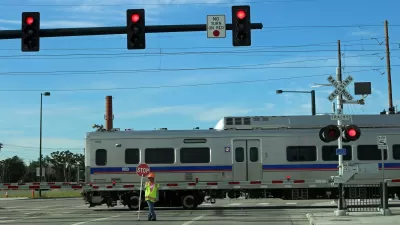Recent problems on the commuter rail operations contracted out by the Massachusetts Bay Transportation Authority and Denver's Regional Transportation District caught the eye of Governing's transportation and infrastructure reporter.
Denver's recent problems with crossing gates on its new A and B Lines were posted here on Nov. 9. Had it not been for a waiver granted by the Federal Railroad Administration on Nov. 5, both lines, which began operation this year, would have shut down.
In addition to a fine for missing on-time performance, "Denver Transit Partners, the private company that oversees the rail,...has had to pay $250,000 a month for signaling issues, or about $1.25 million so far," reports Daniel C. Vock for Governing, referring to the 'flaggers' needed at grade crossings because the gates have not been performing correctly.
“We’re in a bit of a world of hurt," said John Thompson, the executive project director of Denver Transit Partners. "There’s no question about that, because we didn’t see that we’d be faced with these deductions when we bid these contracts six years ago."
In Boston, the Massachusetts Bay Transportation Authority (MBTA) is in the third year of an eight- to 12-year contract with Paris-based Keolis Commuter Services. The company, also has contracts with Virginia Railway Express (VRE) and bus operations in other states.
"Keolis has paid more than $12 million in fines in its first two years of running commuter rail for MBTA," reports Volk. This year it has paid another $1 million in fines.
While the fines may not seem like much in the context of a 12-year deal worth roughly $4.2 billion, Keolis has said that it is losing money on its Boston-area service.
At the same time, Keolis boasts of setting a recent record for on-time performance rate for all lines. Similarly, before things went south in Denver, the A Line received kudos for its electrified, level-boarding service, complete with positive train control, a first for commuter rail lines.
If private contractors are to take the blame for commuter rail problems, who takes the blame for agency-operated services? New Jersey Transit comes to mind, and Metro-North's safety record has been criticized by the Federal Railroad Administration.
Related in media:
- Complete Colorado: RTD’s unreliable A-Line: How flawed incentives lead to poor performance,
November 22, 2016
Related in Planetizen
FULL STORY: Private Companies Face Big Fines for Commuter Rail Problems

Planetizen Federal Action Tracker
A weekly monitor of how Trump’s orders and actions are impacting planners and planning in America.

Congressman Proposes Bill to Rename DC Metro “Trump Train”
The Make Autorail Great Again Act would withhold federal funding to the system until the Washington Metropolitan Area Transit Authority (WMATA), rebrands as the Washington Metropolitan Authority for Greater Access (WMAGA).

DARTSpace Platform Streamlines Dallas TOD Application Process
The Dallas transit agency hopes a shorter permitting timeline will boost transit-oriented development around rail stations.

Renters Now Outnumber Homeowners in Over 200 US Suburbs
High housing costs in city centers and the new-found flexibility offered by remote work are pushing more renters to suburban areas.

The Tiny, Adorable $7,000 Car Turning Japan Onto EVs
The single seat Mibot charges from a regular plug as quickly as an iPad, and is about half the price of an average EV.

Supreme Court Ruling in Pipeline Case Guts Federal Environmental Law
The decision limits the scope of a federal law that mandates extensive environmental impact reviews of energy, infrastructure, and transportation projects.
Urban Design for Planners 1: Software Tools
This six-course series explores essential urban design concepts using open source software and equips planners with the tools they need to participate fully in the urban design process.
Planning for Universal Design
Learn the tools for implementing Universal Design in planning regulations.
Municipality of Princeton
Roanoke Valley-Alleghany Regional Commission
City of Mt Shasta
City of Camden Redevelopment Agency
City of Astoria
Transportation Research & Education Center (TREC) at Portland State University
US High Speed Rail Association
City of Camden Redevelopment Agency
Municipality of Princeton (NJ)




























